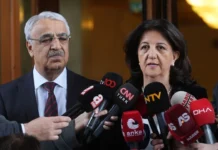Aslan Özdemir, the managing editor of Turkish satirical magazine LeMan, was detained at İstanbul Airport on Friday as part of an ongoing investigation into the magazine over a controversial cartoon that allegedly depicted the Prophet Muhammad, Turkish Minute reported, citing local media.
Özdemir, who was previously reported to be abroad and was the subject of a detention warrant, was taken into custody after arriving on a Turkish Airlines flight from Marseille.
The magazine’s staff is under investigation due to a cartoon in LeMan’s June 26 issue depicting two men named Muhammad and Moses greeting each other above a bombed city, which sparked angry protests from religious and conservative circles in İstanbul and attracted condemnation from President Recep Tayyip Erdoğan and senior officials from his government.
The magazine said the illustration was a political critique of Israel’s bombing of Gaza, not a depiction of religious figures.
On June 30 hundreds of angry protesters gathered outside LeMan’s İstanbul headquarters, attacking the building and prompting police intervention with rubber bullets and tear gas. Protesters chanted, “We will do anything for our Prophet. We will die, we will kill!”
Four of the magazine’s staff members were placed in pretrial detention last week as part of the investigation launched by İstanbul prosecutors under Article 216 of the Turkish Penal Code for incitement to hatred and enmity and openly insulting religious values. Arrested were Zafer Aknar (managing editor), Cebrail Okçu (graphic designer), Doğan Pehlevan (cartoonist) and Ali Yavuz (manager). Rights groups criticized the use of rear-handcuffing during their detention.
Separately, a court ordered the confiscation of the June 26 issue and imposed a nationwide ban on access to LeMan’s website.
On July 3 Turkey’s media regulator, the Radio and Television Supreme Council (RTÜK), fined Sözcü TV and suspended five programs over a segment in which economist Murat Kubilay commented on the cartoon. RTÜK accused the program of “dividing society” and “fueling polarization.”
Although there is no ban on it in the Islamic holy book, the Quran, the depiction of the Prophet Muhammad is deemed highly offensive by most Muslims. This prohibition stems from a broader Islamic discouragement of visual representations of living beings, especially prophets, to prevent idolatry and to maintain reverence for Allah and his messengers.
Press freedom advocates warn that the case illustrates a broader pattern of repression against independent media in Turkey, where journalists often face prosecution for critical reporting or satire.
Turkey ranks to 159th out of 180 countries in the 2025 World Press Freedom Index, published by Reporters Without Borders (RSF) in May.















